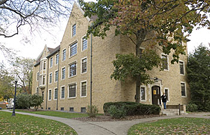by Julie Miller Vick
One of my favorite phrases is “Chance favors the prepared mind,” by Louis Pasteur. I quote it when I talk to students about their job searches. I use it when I urge my own children to continue working to achieve their goals. And I often say it to myself when I have an “Ah ha” moment.
Margaret Newhouse, a career and life coach once explained Pasteur’s quote better than anyone else when she said, “This speaks to appreciating the delicate mix between planning and preparation, on one hand, and openness to serendipity and course correction on the other.” Being prepared to interact through chance encounters with particular employers or luminaries in your field while attending a career fair or an academic conference, has the potential to advance your career. While Career Services staff always urges you to be well-prepared and to plan your job hunting strategy, we don’t want you to be so fixated on your goals that you miss unforeseen opportunities that can help you on your current path or expose you to something totally new.
There’s so much pressure on job seekers to land not just a job, but the “perfect job,” that many feel an almost desperate need to rigidly follow a template or outline of tips. In trying to adhere to such a plan it’s possible to fail to sense things that are staring you in the face.
Having the attitude of a child helps avoid over-analyzing everything. I’m reminded how, many years ago, while visiting Beverly Hills with my family, my then eight year old son walked by a sign that said Rodeo Dr. Having no idea that he was traipsing down one of fashion’s top avenues but knowing that his dad was a family physician and his great uncle a veterinarian, he stopped in his tracks and said, “Wow! Rodeo doctor! What a great job!” Only he saw that; the rest of the family was not open to perceiving it in another way.
Unexpected sources — your hairdresser, grandmother, running partner or insurance agent — may have information, or a point-of-view, that can open up a range of possibilities you might have overlooked. Being open to possibility – and serendipity – can reveal options and opportunities that can change your life.









